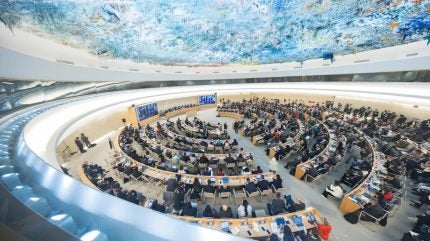
With the 78th World Health Assembly ending today, all eyes have been on this year’s World Health Organization (WHO) member’s meeting due to one notable – and sizeable – absence.
For the first time since 1948, the US was absent from the annual assembly in Geneva, Switzerland, which serves as a forum for discussing and voting on policies that will shape global health for years to come.

Discover B2B Marketing That Performs
Combine business intelligence and editorial excellence to reach engaged professionals across 36 leading media platforms.
US President Donald Trump has been vociferous in his issues with WHO citing the health agency’s “political sways”, “mishandling of Covid-19”, and “unfair payment demands”. The country is set to withdraw from the WHO in January 2026 and appears to have felt no need to send delegates to this year’s meeting.
With WHO’s historically largest financial contributor absent, Pharmaceutical Technology looks at the key policies signed into action at the 78th World Health Assembly.
Pandemic agreement formally adopted
The meeting kicked off with an agreement that came after years of debates between governments. WHO member states finally adopted the world’s first Pandemic Agreement, a framework that includes a variety of measures to shore up the world’s infectious disease defences via health initiatives and instilling a ‘One Health’ approach. The international joint initiative will see a pathogen access and benefit sharing system, building geographically diverse research and development capacities, and creating a global health emergency workforce, among others.
“Now that the agreement has been brought to life, we must all act with the same urgency to implement its critical elements, including systems to ensure equitable access to life-saving pandemic-related health products,” said WHO Director-General Dr Tedros Adhanom Ghebreyesus.

US Tariffs are shifting - will you react or anticipate?
Don’t let policy changes catch you off guard. Stay proactive with real-time data and expert analysis.
By GlobalDataThe agreement is seen as a major win for government collaboration amid the funding drought from the US, enabling countries to rally together to fight the next pathogen that threatens global health. Trump has been consistently critical of the agreement, calling it a “power consolidation in WHO’s favour”. The health agency has rebuked this, saying the framework gives WHO no legislative ability to direct the actions of countries in the event of a pandemic.
Funding increase and budget cuts
Under former president Joe Biden, the US gave the WHO $1.28bn in 2022-2023. This amounted to 12% of the WHO’s total budget and was far higher than China’s contribution of $157m. With that money no longer set to trickle into WHO, member states agreed a 20% increase in their membership fees – known as ‘assessed contributions’. The higher fees for member states will add $90m in annual income to the WHO.
WHO also approved its 2026-2027 annual budget at $4.2bn, a knockdown from the WHO’s previous aim of $5.3bn. The organisation stated the downsizing was due to “financial constraints”. It is also significantly down on the 2024-2025 budget of $6.8bn. Looking at the original estimate for 2026-2027, WHO seemed to factor in the $1.28bn loss of US funding, but had hoped to source an additional $0.2bn. The further $1.1bn cut to this hints that the WHO is experiencing additional financial headwinds beyond Trump’s actions.
China steps into US funding gap
With funding discussions firmly on the table, countries and philanthropic organisations heeded WHO’s call for investment. China promised to give $500m to WHO over the next five years, positioning itself to become the largest financial contributor. There was also a separate $210m raise at the assembly, with Switzerland, Sweden, and Angola amongst the member states with the highest contributions. Foundations involved in the round included the Novo Nordisk Foundation with $57m, along with $13m from the Children’s Investment Fund Foundation.
Notable mentions
There were new guidelines established to improve access to controlled medicines – such as opioids and amphetamines, amongst others – whilst supporting safe and regulated use. WHO said the new roadmap will ensure countries develop and implement balanced national policies that support the medical and scientific use of controlled medicines while protecting individuals and communities from the risks associated with non-medical use. These medications are critical for treating acute and chronic pain, mental health conditions, substance use disorders and other serious health issues.
Separately, member states made rare diseases a global health priority, with promises to integrate rare diseases into national health planning, promote inclusive policies, and accelerate innovation, research, and access to affordable treatment. WHO has set out a 10-year global plan in which it aims to measure global progress in rare disease care.




